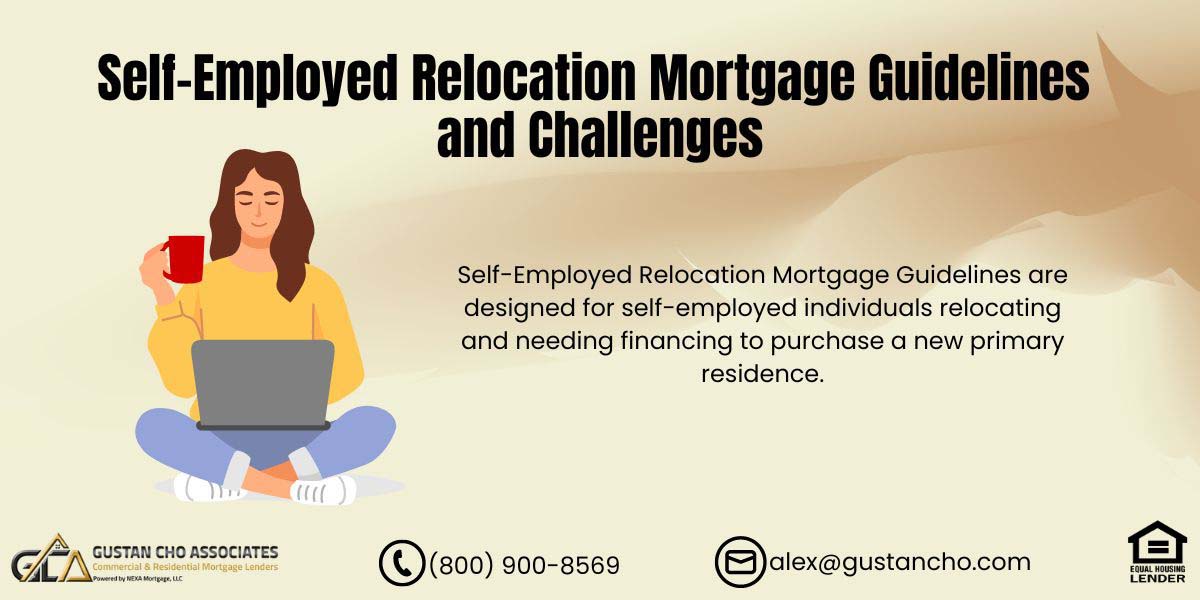In this article, we will cover and discuss Self-Employed Relocation Mortgage Guidelines.
Three primary categories of residential mortgages cater to different types of property ownership:
- Owner-Occupant Mortgages: For people who plan to live in the property they’re buying as their primary residence, mortgages are available specifically designed for them. These loans typically provide more favorable terms, such as reduced interest rates and lower down payment requirements, than other mortgage types.
- Second-Home Loans: These loans are for properties that are not the borrower’s primary residence but are used as a secondary home, such as a vacation home or a property for seasonal use. Loans for second homes generally entail interest rates that are slightly higher and may necessitate a larger down payment when compared to mortgages intended for owner-occupants.
- Investment Property Mortgages: These mortgages are for properties from which the borrower intends to rent or generate income. The interest rates on loans for investment properties are generally higher than those for other types of loans. Additionally, the eligibility criteria for these loans are typically more stringent, requiring larger down payments and higher credit scores.
Among these categories, Primary Home Mortgages are often the preferred choice for many borrowers for several reasons. Firstly, primary home mortgages usually offer lower interest rates than second-home and investment property loans. This lower rate can result in significant savings over the life of the loan. Home loans for primary owner-occupants typically demand a lower down payment, making owning a home possible for a more diverse group of people.
Self-Employed Relocation Mortgage Guidelines For Home Buyers
Now, let’s dive into the specifics of Self-Employed Relocation Mortgages. These mortgages are designed for self-employed individuals relocating and needing financing to purchase a new primary residence. Self-employed borrowers often face unique challenges when applying for a mortgage, such as fluctuating income and complex tax returns.
Many lenders offer specialized mortgage products tailored to the needs of self-employed individuals, including options for relocation purposes.
Self-Employed Relocation Mortgage Guidelines may include:
- Verifying income stability.
- Analyzing tax returns and business financials.
- Assessing creditworthiness.
- Assessing the borrower’s capacity to repay the loan.
To make lending decisions, lenders may also look at factors such as the borrower’s industry experience, client base, and overall financial health.
It’s important for self-employed individuals planning a relocation and considering a mortgage to work with a knowledgeable lender who understands the complexities of self-employment and relocation financing. By doing so, borrowers can navigate the mortgage process more smoothly and secure the right mortgage product for their needs.
Don’t Let a State Move Derail Your Mortgage Application
We understand the extra documentation and proof lenders need for self-employed buyers on the move.Mortgage Guidelines For Self-Employed Borrowers
Gustan Cho Associates provides government, conventional, and non-QM loans tailored for self-employed individuals.
Self-employed borrowers are showing increasing interest in bank statement loans, mainly because these loans do not require income tax returns. Instead, we calculate qualifying monthly income by averaging bank statement deposits over the past 12 months. These loans are efficient and straightforward, with most closing within 30 days once all required documents are submitted and the loan estimate is disclosed.
However, it’s essential to note that Self-Employed Relocation Mortgage Loans can be intricate and must align logically.
How Lenders Underwrite Self-Employed Relocation Mortgage Loans
Self-Employed Relocation Mortgage Loans must be justifiable to mortgage underwriters.
Self-employed individuals and business proprietors encounter hurdles in qualifying for Self-Employed Relocation Mortgage Loans. Relocating a business to a new area adds a layer of risk for lenders. For instance, consider a restaurant owner who has operated their establishment in Chicago for many years but intends to move the business to Tampa, Florida.
This presents a concern for lenders because there is no established history of the business’s operations in Tampa. The mortgage underwriter needs assurance that the business owner can replicate the success achieved in Chicago in the new location of Tampa.
If the business is part of a national franchise, the feasibility increases.
Online Business
Self-employed individuals with online businesses can relocate to different states without significant challenges, especially if they have established management structures to handle operations remotely. This flexibility is particularly advantageous in today’s landscape, where remote work opportunities, including those in online businesses, are becoming increasingly prevalent.
Many companies now offer remote career options, allowing employees to work from anywhere without the need to be physically present in a traditional office setting. When considering a self-employed relocation mortgage, lenders may consider the stability and adaptability of the borrower’s online business, especially if it can continue to thrive during the relocation process.
The shift towards remote work is accompanied by decreased employees’ need to regularly report to a physical office. While some companies may require occasional in-person meetings or visits to the main office, such requirements are usually infrequent, such as once or twice a year.
This trend reflects the evolving nature of work arrangements, prioritizing flexibility and remote accessibility for self-employed individuals and employees alike. Lenders assessing self-employed relocation mortgage applications may consider the borrower’s ability to maintain business operations remotely as a positive factor, contributing to their overall financial stability and loan eligibility.
Freelance Wage Earners Employed As Independent Contractors
Self-employed individuals who work freelance are commonly classified as 1099 independent contractors, allowing them to structure their income and business entities in various ways. Some may receive payments under their name, while others choose to establish legal entities like LLCs, partnerships, or corporations to manage their earnings.
This flexibility allows freelancers to work with multiple companies or vendors simultaneously, expanding their opportunities for income generation.
Self-employed individuals, including those relocating for work, may face distinct challenges and requirements compared to traditional W-2 employees when obtaining a mortgage. To determine eligibility for a self-employed relocation mortgage, lenders assess their income stability, business structure, tax returns, and financial history.
This type of mortgage is designed to accommodate the specific needs of self-employed borrowers moving due to work-related reasons.
In this context, Alex Carlucci, a Senior Vice President at Gustan Cho Associates, stands out as an expert in assisting self-employed individuals with their mortgage needs, including those relocating for work. Borrowers can rest easy knowing that they will receive tailored guidance and assistance throughout the application and approval process for self-employed relocation mortgages, thanks to his skill in navigating the intricacies of these loans.
Relocating With Self-Employment Income? We Can Help You Qualify
Lenders require proof of income stability and business continuity—get expert guidance before you move.Qualifying For A Mortgage For Self-Employed Borrowers With A Direct Lender With No Overlays
The team at Gustan Cho Associates are experts in originating and funding self-employed mortgage loans. We are experts in structuring self-employed borrowers relocating to other states. Many residents of high-tax states are fleeing to states like Tennessee, Ohio, Kentucky, Mississippi, Colorado, Florida, Texas, Georgia, Indiana, Michigan. For more information about this article, feel free to contact us at Gustan Cho Associates at 800-900-8569 or text us for faster response. Or email us at alex@gustancho.com.
FAQ: Self-Employed Relocation Mortgage Guidelines And Challenges
-
1. What are the primary categories of residential mortgages? There are three primary categories of residential mortgages:
- Owner-Occupant Mortgages: Individuals intending to reside in the property they purchase as their primary residence are the target audience for this product. These loans often offer favorable terms like lower interest rates and reduced down payment requirements.
- Second-Home Loans: These are intended for properties that are not the borrower’s primary residence but serve as secondary homes, such as vacation homes. Interest rates for second-home loans are slightly higher, and they may require a larger down payment.
- Investment Property Mortgages: For properties from which the borrower intends to generate rental income. Interest rates are typically higher, and eligibility criteria are more stringent, including larger down payments and higher credit score requirements.
-
2. Why are Primary Home Mortgages often preferred? Primary Home Mortgages are often preferred due to lower interest rates than second-home and investment property loans. Typically, they necessitate a smaller initial payment, which expands the possibility of homeownership to a broader group of people.
-
3. What are Self-Employed Relocation Mortgage Guidelines? Self-Employed Relocation Mortgage Guidelines are designed for self-employed individuals relocating and needing financing to purchase a new primary residence. These guidelines may include verifying income stability, analyzing tax returns and business financials, assessing creditworthiness, and evaluating the borrower’s capacity to repay the loan.
-
4. How do lenders underwrite Self-Employed Relocation Mortgage Loans? Lenders underwrite Self-Employed Relocation Mortgage Loans by assessing the borrower’s income stability, business structure, tax returns, and overall financial health. They may also consider industry experience, client base, and the feasibility of replicating business success in the new location.
-
5. What mortgage options are available for self-employed borrowers? Self-employed borrowers have options like bank statement loans, which calculate qualifying monthly income based on average bank statement deposits over the past 12 months. These loans are efficient and straightforward, often closing within 30 days once all required documents are submitted.
-
6. How can self-employed individuals qualify for a mortgage with no overlays? Self-employed individuals can qualify for mortgages with no overlays by working with direct lenders like Gustan Cho Associates. These lenders specialize in originating and funding self-employed mortgage loans, providing tailored solutions for borrowers relocating for work or other purposes.
This blog about Self-Employed Relocation Mortgage Guidelines And Challenges was updated on March 28th, 2024.










